(JEE Adavanced 2014)
X and Y are two volatile liquids with molecular weights 10 g mol−1 and 40 g mol1 respectively. Two cotton plugs, one soaked in X and the other soaked in Y, are simultaneously placed at the ends of a tube with length L=24 cn as shown in the figure. The tube is filled with an inert gas at 1 atmosphere pressure and a temperature of 300 K. Vapours of X and Y react to form a product which is first observed at a distance of d cm from the plug soaked in X. Take X and Y to have equal molecular diameters and assume ideal behaviour for the inert gas and the two vapours.
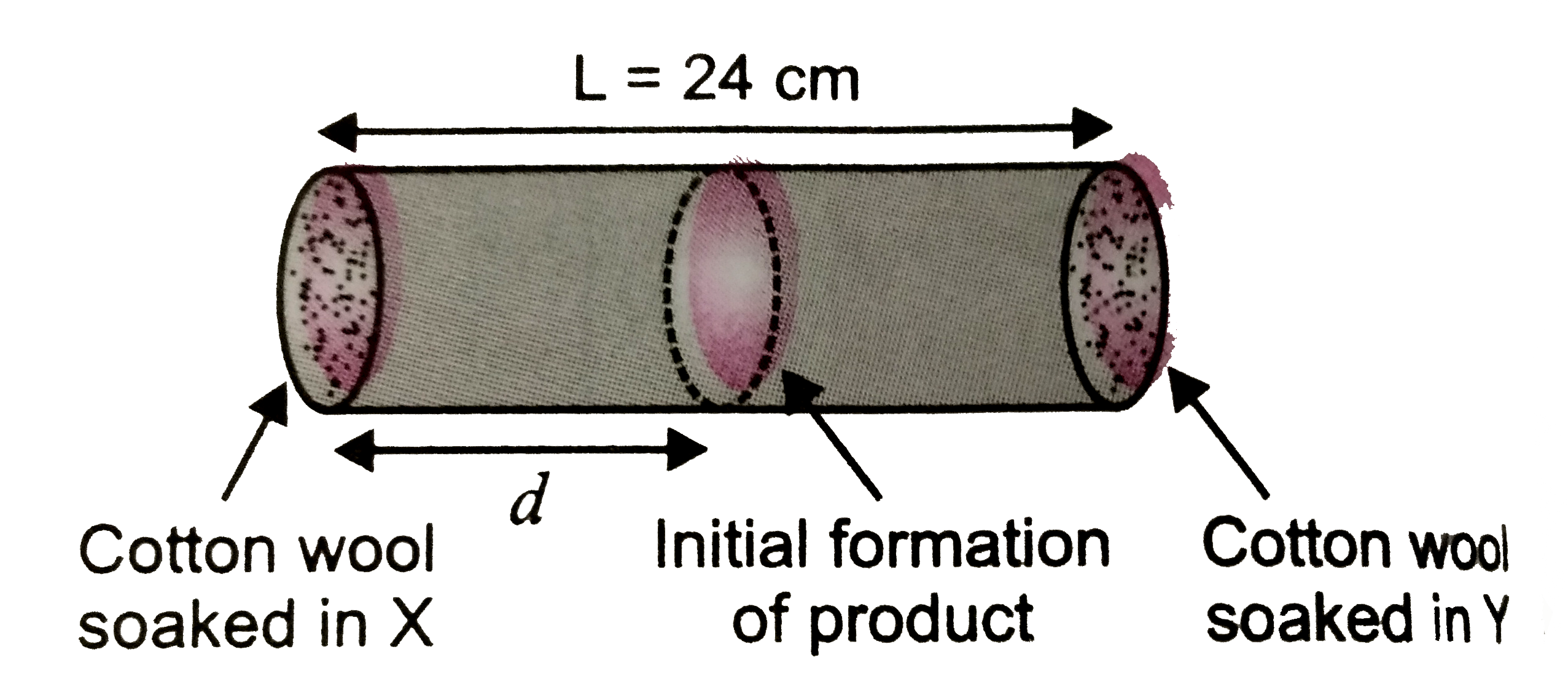
The experimental value of d is found to be smaller than the estimate obtained using Graham's law. This is due to
large mean free path of X as compared to the of Y
large mean free path of Y as compared to the of X
increased collision frequency of Y with the inert gas as compared to that of X with the inert gas
increased collision frequency of X with the inert gas as compared to that of Y with the inert gas
The correct Answer is:D
As collision frequency increases, molecular speed decreases. Due to higher collision frequency of X, molecular spedd of X decreases. That is why d is found to be smaller than the estimate.
Topper's Solved these Questions
- STATES OF MATTER : GASES AND LIQUIDESBOOK - PRADEEPCHAPTER - STATES OF MATTER : GASES AND LIQUIDESEXERCISE - IV MATCHING TYPE QUESTIONS
1 Videos
- STATES OF MATTER : GASES AND LIQUIDESBOOK - PRADEEPCHAPTER - STATES OF MATTER : GASES AND LIQUIDESEXERCISE - V MATRIX-MATCH TYPE QUESTIONS
2 Videos
- STATES OF MATTER : GASES AND LIQUIDESBOOK - PRADEEPCHAPTER - STATES OF MATTER : GASES AND LIQUIDESEXERCISE - II. Multiple Choice Questions
7 Videos
- SOME p-BLOCK ELEMENTSBOOK - PRADEEPCHAPTER - SOME p-BLOCK ELEMENTSEXERCISE - Competition Focus (JEE( Main and Advanced)/Medical Entrance) VIII. Assertion-Reason Type Questions (Type I)
23 Videos
- STATES OF MATTER: SOLID MATTERBOOK - PRADEEPCHAPTER - STATES OF MATTER: SOLID MATTEREXERCISE - COMPETITION FOCUS (ASSERTION-REASON)
17 Videos
Similar Questions
X and Y are two volatile liquids with molar weights of 10gmol−1 and 40gmol−1 respectively. Two cotton plugs, one soaked in X and the other soaked in Y, are simultaneously placed at the ends of a tube of length L=24 cm, as shown in the figure.
The tube is filled with an inert gas at 1 atm pressure and a temperature of 300K. Vapours of X and Y react to form a product whichh is first observed at a distance dcm from the plug soaked in X.
Take X and Y to have equal molecular diameters and assume ideal behaviour for the inert gas and two vapours.
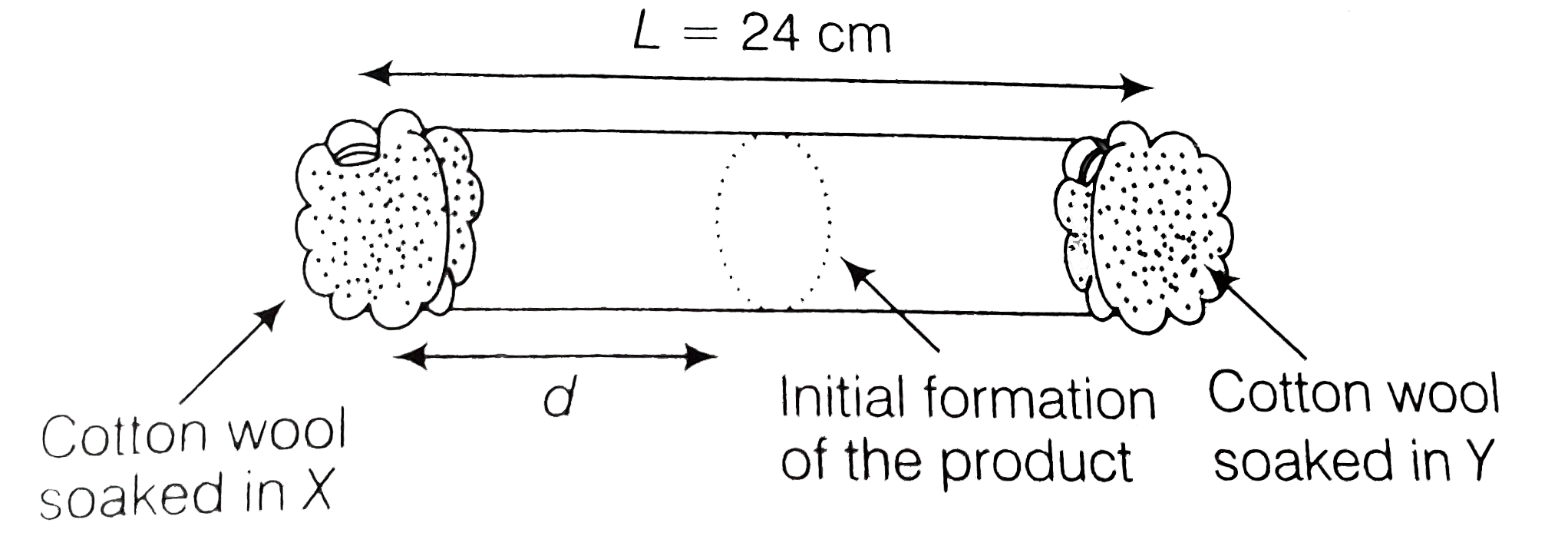
The value of d in cm (shown in figure), as estimated from Graham's law, is
View SolutionX and Y are two volatile liquids with molar weights of 10gmol−1 and 40gmol−1 respectively. Two cotton plugs, one soaked in X and the other soaked in Y, are simultaneously placed at the ends of a tube of length L=24 cm, as shown in the figure.
The tube is filled with an inert gas at 1 atm pressure and a temperature of 300K. Vapours of X and Y react to form a product whichh is first observed at a distance dcm from the plug soaked in X.
Take X and Y to have equal molecular diameters and assume ideal behaviour for the inert gas and two vapours.

The value of d in cm (shown in figure), as estimated from Graham's law, is
View Solution
Knowledge Check
X and Y are two volatile liquids with molar weights of 10gmol−1 and 40gmol−1 respectively. Two cotton plugs, one soaked in X and the other soaked in Y, are simultaneously placed at the ends of a tube of length L=24 cm, as shown in the figure.
The tube is filled with an inert gas at 1 atm pressure and a temperature of 300K. Vapours of X and Y react to form a product whichh is first observed at a distance dcm from the plug soaked in X.
Take X and Y to have equal molecular diameters and assume ideal behaviour for the inert gas and two vapours.
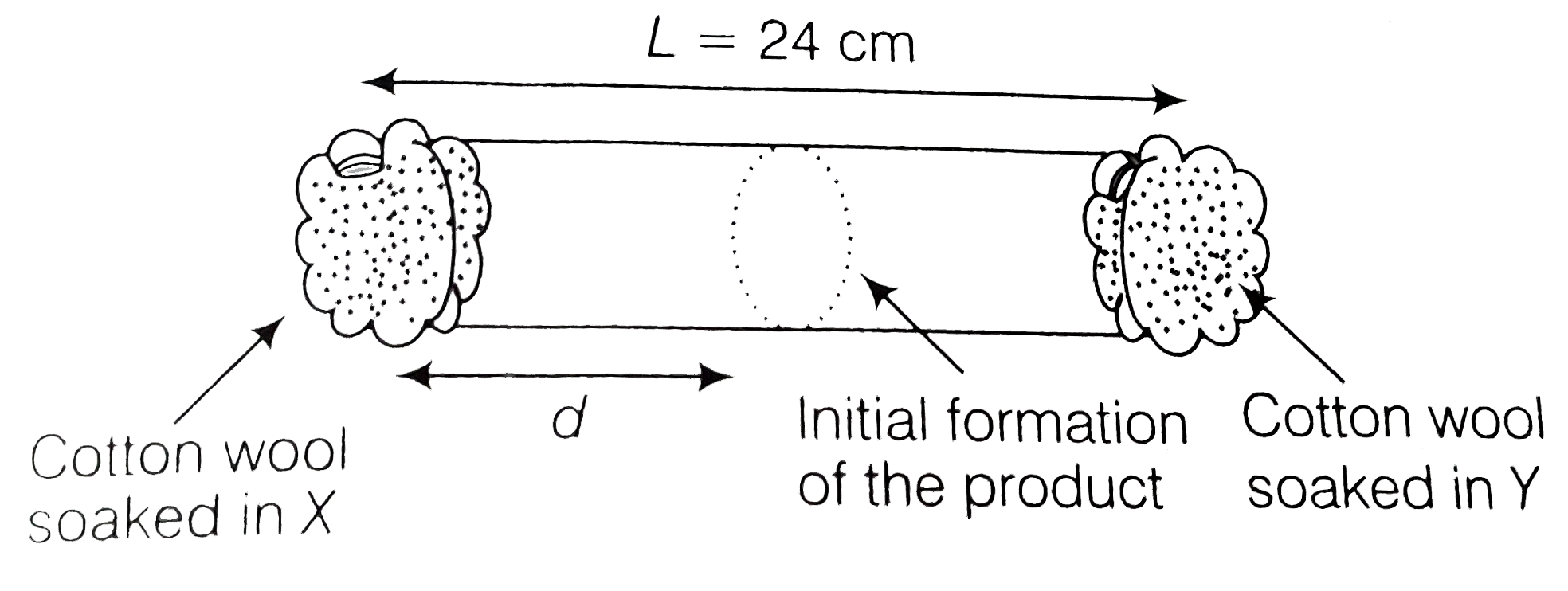
The experimental value of d is found to be smaller than the estimate obtained using Graham's law. This is due toAlarger mena free path for X as a compared of that of YBlarger mean free path for Y as compared to that of XCincreased collision frequency of Y with the inert gas as compared to that of X with the inert gasDincreased collision frequency of X with the inert gas as compared to that of Y with the inert gasX and Y are two volatile liquids with molar weights of 10gmol−1 and 40gmol−1 respectively. Two cotton plugs, one soaked in X and the other soaked in Y, are simultaneously placed at the ends of a tube of length L=24 cm, as shown in the figure.
The tube is filled with an inert gas at 1 atm pressure and a temperature of 300K. Vapours of X and Y react to form a product whichh is first observed at a distance dcm from the plug soaked in X.
Take X and Y to have equal molecular diameters and assume ideal behaviour for the inert gas and two vapours.

The value of d in cm (shown in figure), as estimated from Graham's law, isA8B12C16D20Two pieces of cotton wool soaked separetely in aqueous solution of NH3 and HCl are placed at opposite ends of a close glass tube as shown in diagram
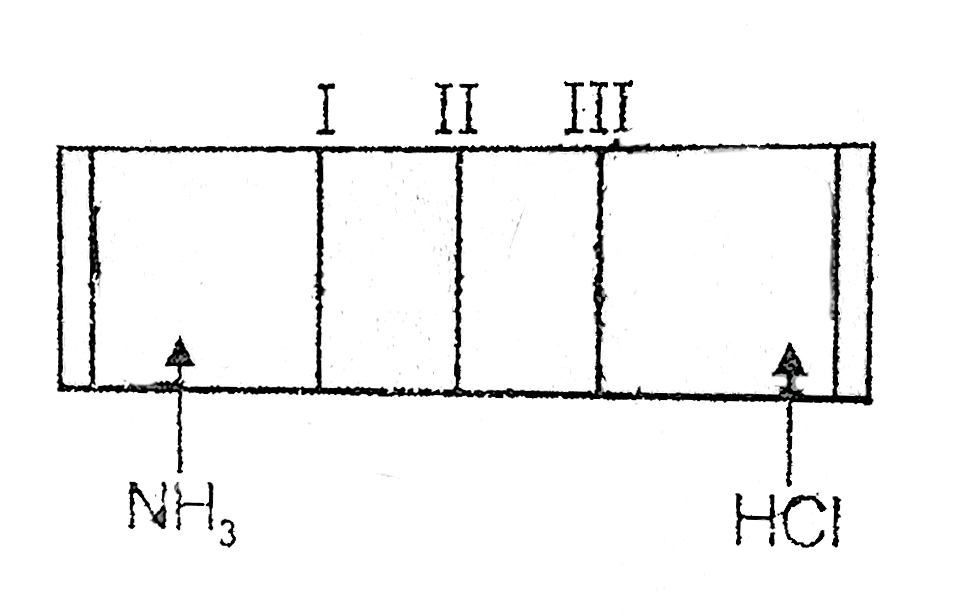
Select nearest position where white solid is formedAIBIICIIIDWhite solid does not formed
A L Shaped tube containing liquid of density pis accelerated horizontally with acceleration as shown in the figure. The end of tube B is closed while end A is open. If the atmospheric pressure is Po. Then the pressure at B is :
View SolutionA tube of length 50 cm is containing a gas in two secitons separated by a mercury column of length 10cm as shown in figure. The tube's open end is just inside the Hg surface in container, find pressure of gas in upper section. [Assume atmospheric pressure = 75 cm of Hg column]
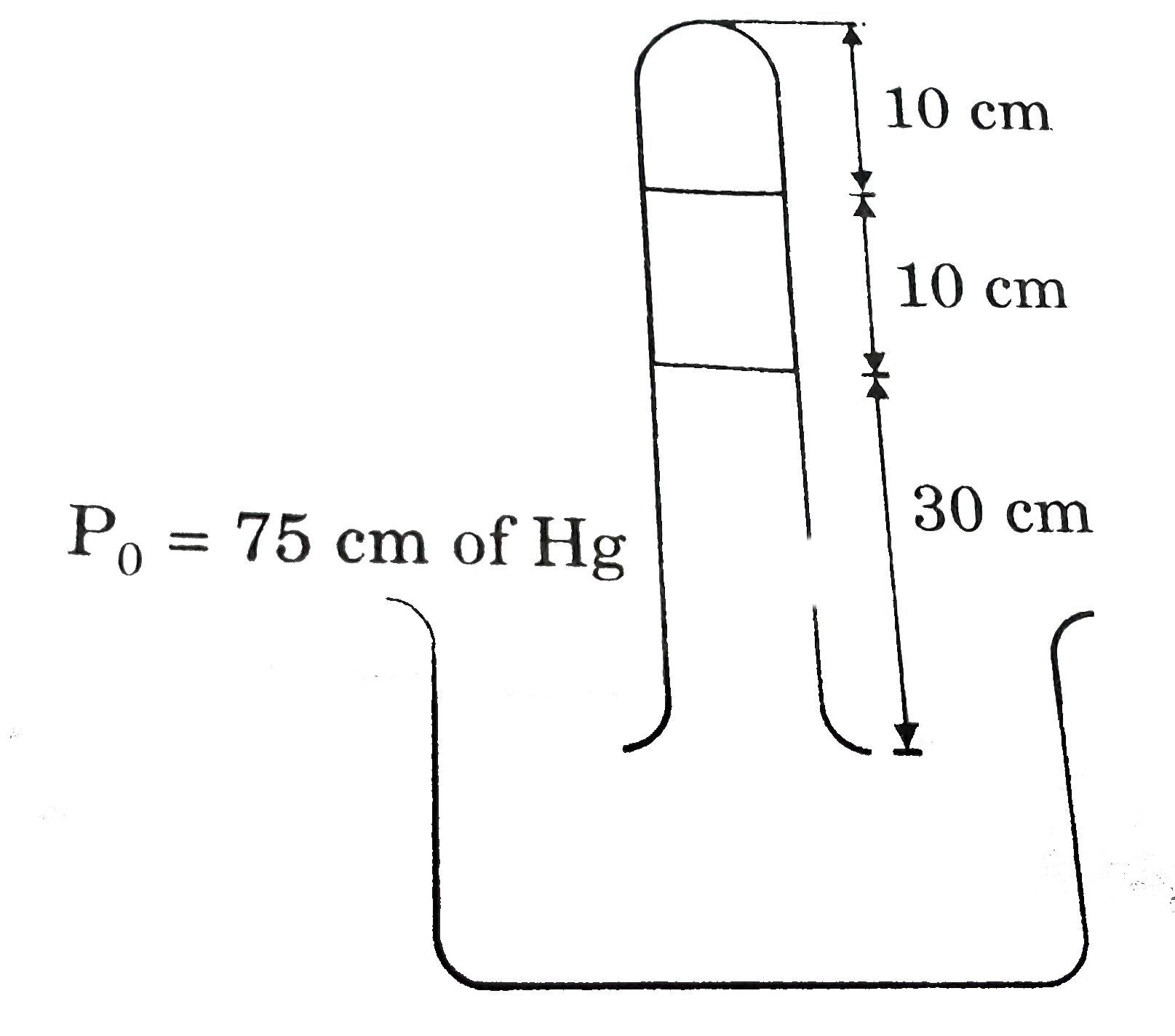
View SolutionA tube in vertical plane is shown in figure. It is filled with a liquid of density ρ and its end B is closed. Then the force exerted by the fluid on the tube at end B will be : [Neglect atmospheric pressure and assume the radius of the tube to be negligible in comparison to l]
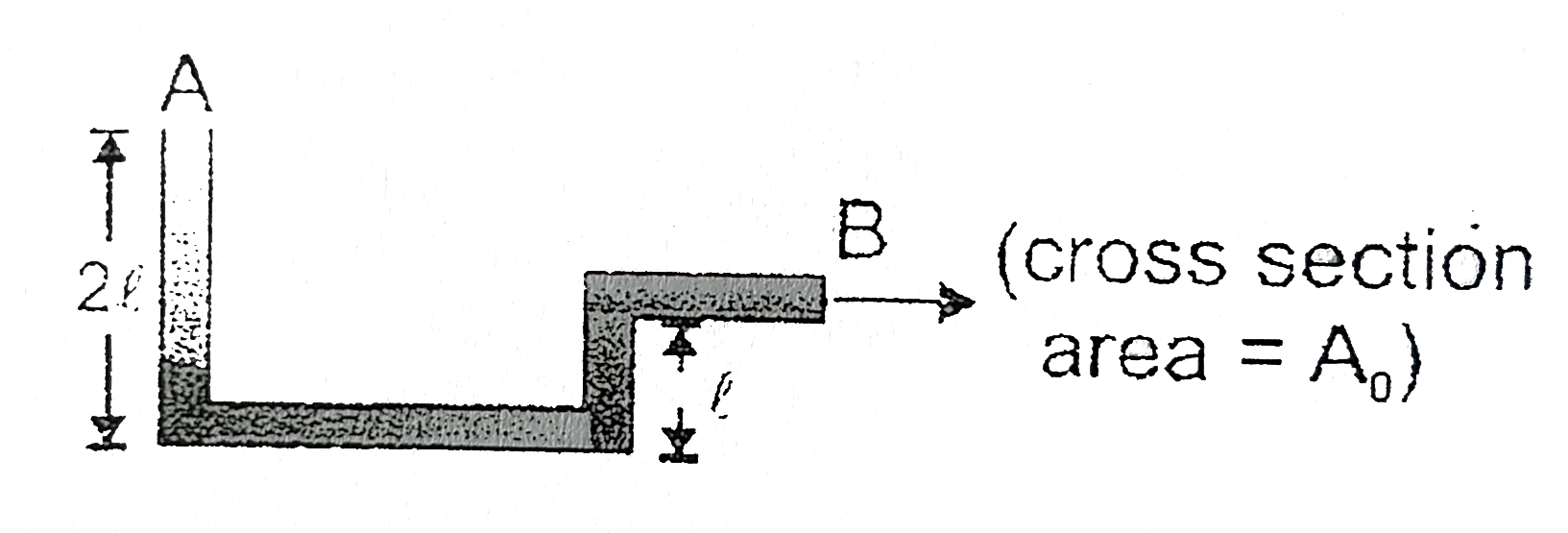
View SolutionA liquid of mass 1 kg is filled in a flask as shown in figure. The force exerted by the flask on the liquid is (g=10m/s2) [Neglect atmospheric pressure]:
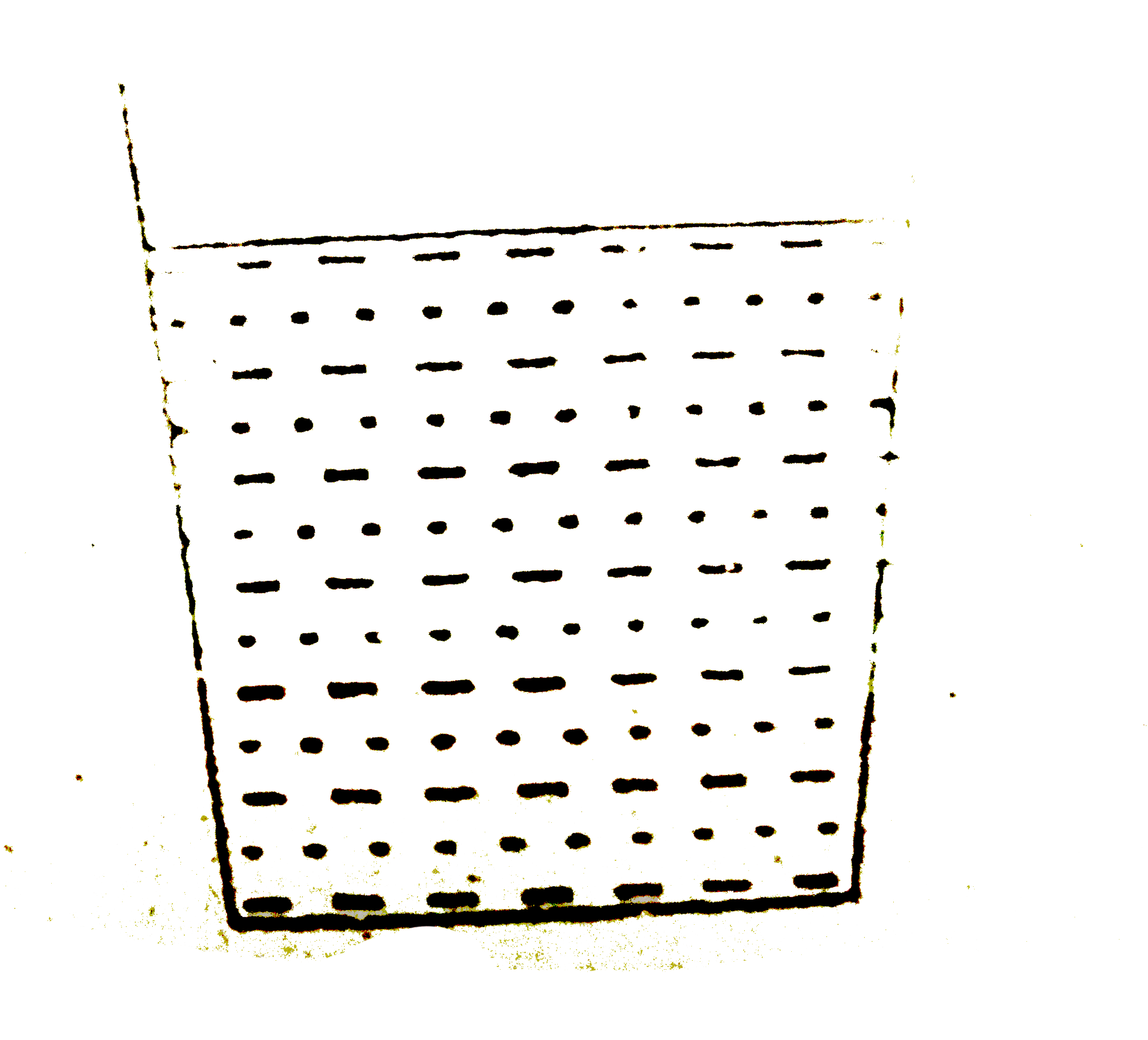
View SolutionWhat is the molecular weight of a gas whose density 40∘Cand785mm of Hg pressure is 1.3gL−1?
View Solution
